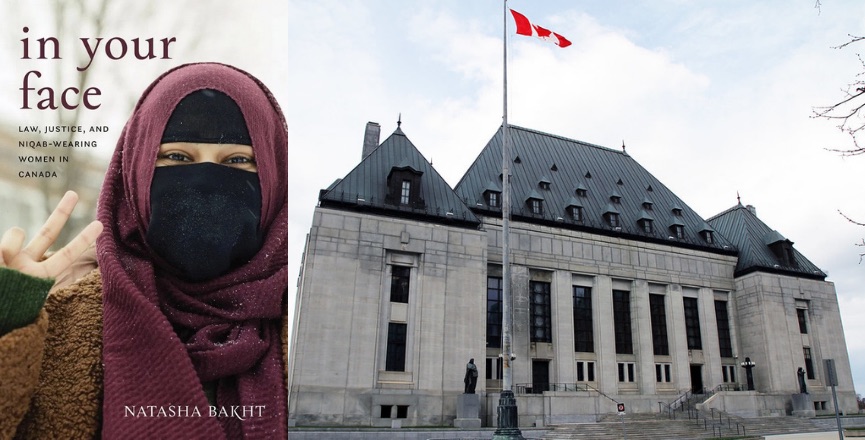“Not welcome.” “Letterbox.” “Anti-women.” Those are the words used by former French president Nicolas Sarkozy, current U.K. Prime Minister Boris Johnson, and former Canadian prime minister Stephen Harper, respectively, to describe either the niqab (sometimes called the burqa) or the Muslim women wearing it.
The niqab is a full-body religious veil that some Muslim women wear, which leaves only their eyes visible.
A religious symbol worn by a minority of Muslim women, the niqab has turned into a political wedge issue that leaves no political party indifferent. It has become a sign of women’s oppression that pits some feminists against others, a scary piece of clothing for the general population, a sign of extremism for others.
Is the niqab really all of that? Are the Muslim women donning the niqab who we think they are?
It is with these questions and many others that Natasha Bakht, a legal scholar at the University of Ottawa, Shirley E. Greenberg Chair for Women and the Legal Profession, starts her inquest in her book, In Your Face, published by Delve Books in October 2020.
Bakht is not studying the religious aspect of the niqab. Rather, she tries through her book to know who these women are; women often spoken about in media and by politicians but rarely allowed to speak about themselves.
Bakht tackles and explores this topic with humility, honesty and open-mindedness.
Bakht interviewed several Canadian-Muslim women who decided to wear the niqab.
Her findings came to confirm what several other studies conducted in other Western countries concluded: adopting the niqab is a personal choice, most of the time motivated by a religious and spiritual journey that each of these women embarked on at some point in their lives. Bakht also learned that most of the time their decisions came in opposition to what male relatives wished for them or advised them against.
Listening to these niqab-wearing women, Bakht draws pictures for the reader of women who mostly have similar aspirations as “normal” women, in terms of personal ambition, family, education, and career.
But Bakht doesn’t only speak to women: she also compiles successive laws, mainly in Western countries — and other countries around the world — legislating the treatment of the niqab and women who wear it. In a very unique way, Bakht examines the banning of the niqab in the courtrooms of Western liberal democracies and how legislative prohibitions treat women wearing the niqab, whether they are judges, lawyers or defendants.
Does a judge really need to look at the face of a witness in the courtroom to know whether she is telling the truth? Some judges have decided yes, while others have left the door open a tiny crack.
Today with the COVID-19 pandemic and the requirement to wear masks, we are ironically thrown back to some of our own prejudices regarding the importance of “seeing” the facial expressions of the “other” and thus by extension, the legality of banning the niqab.
Amidst all these findings and answers related to women wearing the niqab, Bakht relays to us some of the ongoing discrimination faced by these women when looking for education, finding jobs and getting public services. They are harshly judged and sometimes the victims of physical and verbal assaults.
Nevertheless, many of these women remain very resilient and optimistic about overcoming the obstacles posed by legal bans and the staunch social attitudes towards them.
With her book, Bakht bring readers close to one of the most misunderstood, “despised,” and marginalized groups in our societies. Their answers, at times very candid, their reactions to insults, positive and pragmatic, and their determination to remain attached to their faith, sound very true and very familiar.
I have never worn a niqab but wearing the hijab — a head covering — and living in Canada for the last 30 years of my life, I can, to a certain degree, understand what these women are going through in terms of spirituality, discrimination and lack of understanding.
Never in her book does Bakht paint portraits of these women as victims, despite the discrimination and legal bans targeting them in Quebec, for instance, and in other parts of the world.
With In Your Face, Natasha Bakht sheds light on the hypocrisy that many liberal democracies have been hiding behind: a “veiled” veneer of oppression, falsely convincing us that women are free to wear what they want… until they decide to wear a niqab.
Monia Mazigh was born and raised in Tunisia and immigrated to Canada in 1991. Mazigh was catapulted onto the public stage in 2002 when her husband, Maher Arar, was deported to Syria where he was tortured and held without charge for over a year. She campaigned tirelessly for his release. You can follow her on Twitter @MoniaMazigh or on her blog.
Image credit: Alex Guibord/Flickr



